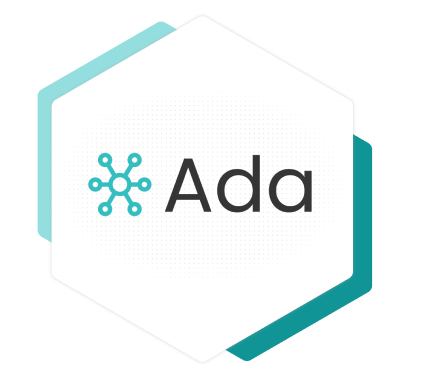Overview
Ask Ada is an AI-powered assistant built into Bizagi Apps that helps you work with your project’s data using natural language.
Instead of writing technical queries, you can simply ask questions in everyday language and receive answers, explanations, or visualizations such as charts and tables.
Ask Ada understands the context of your conversation, so responses remain coherent and relevant as you interact.
Once you start exploring, it uses Bizagi Data domain to interpret your questions accurately and apply the right filters—for example, recognizing that “Europe” includes multiple countries and tailoring results accordingly.
Ask Ada enables the possibility to chat with your corporate documents and policies with the configuration of Knowledge Base Catalogs.
Finally, Ask Ada enables end users to access Monitoring. It allows to talk to Ask Ada about open cases, and reassign them in real time within your direct team (first level of reporting).

Configure Ask Ada
To set up and utilize the Ask Ada feature, you need to follow these steps:
1. Configure Data domains in Bizagi Studio
Start by configuring Data domains in Bizagi Studio. A Data domain serves as a mechanism for users to define a set of restricted entities that provide information through the Ask Ada feature. This feature empowers you to effectively manage desired data governance.
By leveraging Data domains, app users can engage with Ask Ada, pinpointing specific sources of information that enrich and fuel this feature. This approach guarantees a customized and controlled access to data, thereby improving the precision and relevance of insights delivered by Ask Ada within an app.
2. Assign Data domains in the App Designer Editor
Following the configuration of Data Domains, move on to assigning them in the App Designer editor.
In this step, you need to associate specific Data Domains with each Persona of an app, establishing access levels to privileged information.
This procedure guarantees that each Persona accesses only pertinent and authorized data, offering meticulous control and adhering to the principles of data governance. Furthermore, this step ensures that Ask Ada functions within the designated data domains, fulfilling your app's specific requirements.
Important: The App should contain collections visible and available to the Persona in any page, related to process entities to be able to retrieve information.
3. Configure Bizagi Files Knowledge in Bizagi Studio
Create Knowledge Base Catalogs in Bizagi Studio using Bizagi Files to enable Ask Ada to reference structured collections of Enterprise Knowledge during process execution.
Bizagi Files Knowledge allows you to define curated sources of information, such as internal documentation, manuals, or policies, that Bizagi processes and makes available to its AI components.
By integrating Bizagi Files Knowledge Catalogs, Ask Ada can “chat” with the documents that define how the company operates. This enables access to curated information and policies, allowing end users to interact with them using natural language directly from the app.
4. Assign Knowledge in App Designer Editor
After creating your Knowledge Base Catalogs, the next step is assigning them to Ask Ada in the App Designer editor. This assignment is required because Ask Ada will only use the catalogs you explicitly assign, ensuring responses are based on approved sources.
5. Use Ask Ada in a Published app
Once Data domains and Knowledge are configured and assigned, end users with a Persona configured, can seamlessly use Ask Ada within a published app.
To delve deeper into Ask Ada's capabilities, explore the Using Ask Ada article, which includes information on Ask Ada's Open Cases Monitoring feature where you can run queries, view open cases, and reassign them within your direct team (first level of reporting) in real time. Using natural language, you can check the status of open cases and processes, bringing open case information from the BAM (Business Activity Monitoring) capabilities from the Work Portal into the Ask Ada experience.
Last Updated 11/20/2025 3:55:36 PM